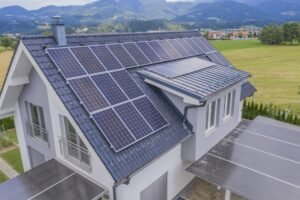Is the rising cost of electricity making you hesitate about your next bill?
Solar energy in India is no longer a future plan.
It’s happening now, and 2025 brings a fresh batch of powerful government schemes and solar subsidy options that are putting power back into your hands, literally.
What Is a Solar Subsidy and Why Should You Care?
A solar subsidy is a type of government funding intended to assist farms, businesses, and homeowners in lowering the cost of installing solar panels.
Consider it a partial refund that significantly lowers the cost of moving to solar.
The largest obstacle to installing solar systems for the majority of individuals is cost.
The initial expense is lessened, and the return on your solar investment is accelerated by government subsidies.
In 2025, how much can you expect to receive back?
Let’s examine the specifics.
How the PM Surya Ghar Muft Bijli Yojana Can Help You Save in 2025
Can your rooftop really give you free electricity?
Yes, and the government is making it easier than ever.
In 2025, the PM Surya Ghar Muft Bijli Yojana has been updated to help more Indian families go solar.
Under this scheme, homeowners can get up to ₹78,000 in subsidies when they install rooftop solar panels.
The goal? To bring free solar power to 1 crore homes across India.
Once your system is installed, you can receive up to 300 units of free electricity every month, which means much lower power bills or even no bill at all, depending on your usage.
The best part? The process has been made super simple.
You can apply online through the National Solar Portal, and get approval in just 14 days, no long delays or confusing paperwork.
So, if you’re a homeowner looking to save money, reduce your dependence on the power grid, and support a cleaner planet, this scheme is a smart and timely choice.
Is Net-metering still a thing in 2025?
Can You Really Earn from Extra Solar Power? Yes, You Can!
When your solar panels produce more electricity than your home or business uses, that extra power doesn’t go to waste.
Thanks to net metering, you can send the unused electricity back to the power grid, and in return, you earn credits on your electricity bill.
In 2025, the net metering policy will be made the same across all 28 states, which means it’s now easier and more reliable for everyone, whether you live in a small town or a big city.
These credits help you save even more, especially at night, when your solar panels aren’t producing energy.
Businesses, in particular, benefit a lot from this system, as they can use daytime solar power to reduce electricity costs later.
What Are the 2025 Eligibility Rules and Documents Needed?
Worried that applying for a solar subsidy is still a hassle?
The good news is that it’s now much easier than before!
If you’re a homeowner planning to install solar panels, you only need three basic documents:
Proof that you own the property
Your latest electricity bill
Your Aadhaar card
That’s it! Once you have these, you can apply online through the National Solar Portal, and approvals now come through in as little as 14 days.
You can benefit from the MSME Solar Scheme if you run a business or an industry.
This scheme has a single-window system, which means one place for all your documents and approvals, making the process faster and smoother.
Because of minimal paperwork, businesses can get subsidies quicker and start saving on power bills sooner.
Can Businesses and Housing Societies Also Get Solar Subsidies?
Is solar only for individual homeowners?

Not at all!
By 2025, businesses and housing societies can also receive incentives for installing solar panels, so solar energy is no longer exclusively for households.
Installing solar systems has become simpler for group housing societies and commercial buildings thanks to numerous power distribution companies (DISCOMs).
These partnerships streamline the procedure and lower costs.
A growing number of housing societies are interestingly opting to install community solar systems on their rooftops.
They are able to save a significant amount of money on electricity needed for common areas like water pumps, elevators, and hallway lighting, thanks to these technologies.
Is 2025 the Right Year to Go Solar?
If you’ve been waiting for the “perfect time” to switch to solar, 2025 is your year!
With electricity bills going up, increasing awareness about clean and green energy, and more government subsidies than ever before, this year offers the best opportunity to make the switch.
The government is actively encouraging solar adoption by offering financial support and easy approvals.
That means you can save money while also doing your bit for the environment.
And the best part? You don’t have to do it alone.
Let Solar4All Make It Easy for You
At Solar4All, we handle everything from paperwork and subsidy applications to installing and maintaining your solar system.
Our team will:
-
- Guide you step-by-step
-
- Help you get the maximum subsidy
-
- Ensure a smooth and hassle-free installation
-
- Provide ongoing support and service
